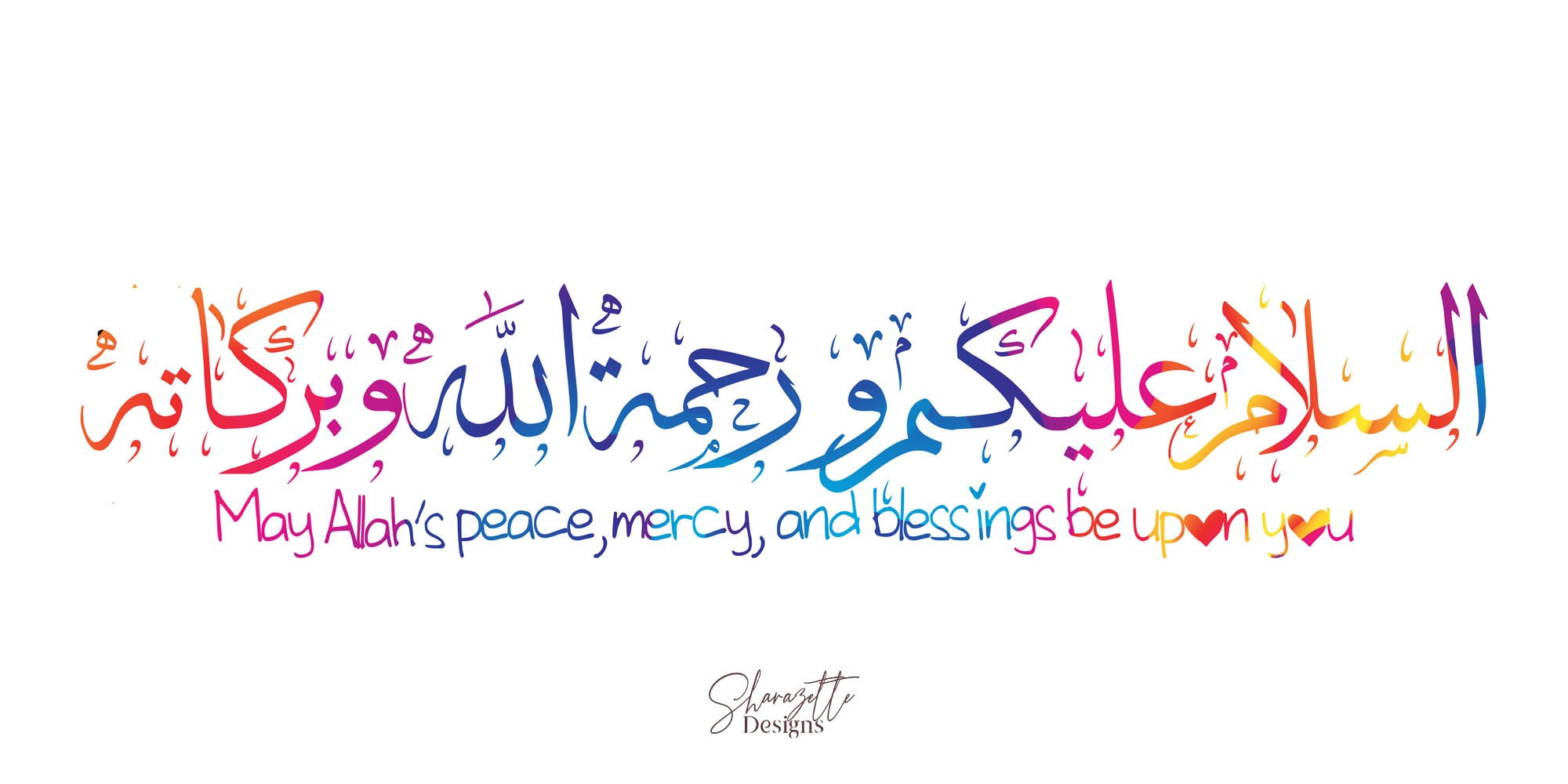
As salam aleykoum wa rahmatoullah, que la lumière et la fraîcheur de cette journée t'apporte une
Assalamu'alaikum Warahmatullah. The meaning of Assalamu'alaikum Warahmatullah is salvation and Allah's grace may be bestowed on you. This is a greeting or salvation that is pronounced by a Muslim when he meets a Muslim brother. This sentence should not be spoken to non-Muslims because they are not safe according to the teachings of Islam.

As Salam Alaykoum Wa Rahmat ALLAH Wa Barakatouh Maîtriser sa colère par la bonne parole Au nom
Salam aleykoum wa rahmatullah wa barakatuh (السَّلَامُ عَلَيْكُمْ وَ رَحْمَةُ اللهِ وَ بَرَكاتُهُ) : Que la paix, la Miséricorde et la bénédiction d'Allah soit sur vous. La façon exacte d'écrire la salutation n'impacte pas le sens si on met un "e" à la place de certains "a".

Salam aleykoum wa rahmatoullah wa barakatouhou chers frères et soeurs. Le secret que je partage
The greeting was routinely deployed whenever and wherever Muslims gathered and interacted, whether socially or within worship and other contexts. "Wa-Alaikum-Salaam," meaning "And unto you peace," was the standard response. Muslim ministers and audiences regularly exchanged the salutation at the beginning and end of lectures and sermons. Common.

Salam Images / As Salamu Alaikum / Walalaikum As Salam Good morning wishes quotes, Beautiful
Common Spelling: Wa Alaikum Assalam; Walaikum Salam; Waalaikumussalam; Wa Alaikum Salaam; Walaikum Assalam Meaning. The short version Waalaikumussalam means 'Peace be upon you, the 2nd version Waalaikumsalam Warahmatullahi means 'Peace be upon you and Allah's mercy.And the full version Waalaikumsalam Warahmatullahi Wabarakatuh means "Peace be upon you and Allah's mercy And blessing"

DinulQayyima / La religion de droiture — Assalam alaykoum wa rahmatouLlah wa barakatouh
English Meaning: "Peace be upon you and God's mercy and blessings.". How to reply when someone says Asslamu Alaikum (in Arabic: اَلسَّلَامُ عَلَيْكُمْ) ? An acceptable response to someone who says Assalamualaikum is wa alaikum assalam (in Arabic وعليكم السلام). You can reply even better. In the Quran it.

Salam Aleykoum Wa Rahmatullah Wa Barakatuh Traduction Communauté MCMS
3. The most complete form of greeting is to say 'As-Salamu `alaykum wa rahmatu-Allahi wa barakatuhu' or 'Salamun `alaykum wa rahmatu-Allahi wa barakatuhu.' Answer Contents Related Is greeting with Salamun `Alaykum Correct? Is it permissible to initiate the greeting by saying `Alayk As-Salam or `Alaykum As-Salam?

Salam aleykoum wa rahmatoullah wa barakatouh !⠀ ⠀ Bonne et agréable journée à tous et à toutes
Assalamualaikum Warahmatullahi Wabarakatuh (in Arabic: اَلسَلامُ عَلَيْكُم وَرَحْمَةُ اَللهِ وَبَرَكاتُهُ) English Meaning: "Peace be upon you and God's mercy and blessings." Fun Fact As-Salam is also one of Allah's 99 names. The meaning of As-Salam is "The Giver of Peace". The One who is free from every imperfection.

AsSalamu Alaykum WaRahmatullahi Wa Barakatuh Islamic Wall Etsy
Wa ʿalaykumu s-salam ( وَعَلَيْكُم ٱلسَّلَامُ) is an Arabic greeting often used by Muslims around the world translating to "may peace be upon you". It is a blessing given to another. It is the standard response to the As-salamu alaykum ( ٱلسَّلَامُ عَلَيْكُمْ) greeting.

Salam alaykoum Calligraphie arabe, Calligraphie, Caligraphie
Ou "As salam aleykoum wa rahmatoullahi wa barakatouh" : que la paix la miséricorde d'Allah ainsi que sa bénédiction soit sur vous". Et encore une fois, vous l'aurez compris, l'interlocuteur devra répondre de la même manière. De même, il faut noter que cette formule peut avoir parfois le sens aussi bien de bonjour que d'au revoir.

DinulQayyima / La religion de droiture — Assalam alaykoum wa rahmatouLlah wa barakatouh
Wa Alaikum Salaam Rahmatullahi Barakatuh Meaning In English Wa alaikum assalam rahmatullahi barakatuh means and unto you be peace and the mercy and Blessings of Allah. Advertisements There are three versions of this greeting response, from the shorter one to the longer. These are: Wa 'alaykum al-salaam وعليكم السلام Meaning: And unto you peace

Salam aleykoum wa rahmatoullah wa barakatouhou chers frères et soeurs Il y a beaucoup parmi nous
Assalamualaikum warahmatullahi wabarakatuh is a wording mentioned in the Quran and Sunnah for giving greeting. Advertisements Giving and returning the greeting is undoubtedly one of the acts of worship encouraged by the Prophet (blessings and peace of Allah be upon him) and enjoined by him.

asSalâm alaykoum wa rahmatoullah CanAm cassetoi YouTube
At the end of formal Islamic prayers, while sitting on the floor, Muslims turn their heads to the right and then to the left, greeting those gathered on each side with As-salamu alaikum wa rahmatullah . "As-salamu alaikum" is a common greeting that means "Peace be with you." Although it is an Arabic phrase, it is used by Muslims around the world.

As Salam Aleykoum Wa Rahmatoullah Wa Barakatouh En Arabe AUTOMASITES
• The best and most complete phrase to use when giving the greeting of Salam is: "As-salamu `alaykum wa rahmatullahi wa barakatuhu" and the best phrase to use when returning the greeting is: "Wa `alaykum As-salam wa rahmatullahi wa barakatuhu."

AssalamoAlaikum Warahmatullahiwabarakatoho Islamic Pinterest Inspirational, Quotes
The phrase "Wa alaikum Salaam Rahmatullahi Barakatuh" holds deep significance in Islamic culture. It is commonly used as a response to the greeting "As-salamu alaykum" and carries a profound message of peace, mercy, and blessings. In this article, we will explore the meaning and significance of this beautiful Arabic phrase. The Greeting:

Wa Alaikum Salam Wa Rahmatullahi Wa Barakatuh In Arabic Text Exemple de Texte
If they say, "Assalamualaikum Warahmatullahi Wabarakatuh" as they greet each other, To which I respond: Wa alaykumu.

As Salam Aleykoum Wa Rahmatoullah Wa Barakatouh En Arabe AUTOMASITES
The salām ( سَلَام, meaning 'peace') has become a religious salutation for Muslims [1] [2] worldwide when greeting each other, though its use as a greeting pre-dates Islam, and is also common among Arabic speakers of other religions (such as Arab Christians and Mizrahi Jews ).